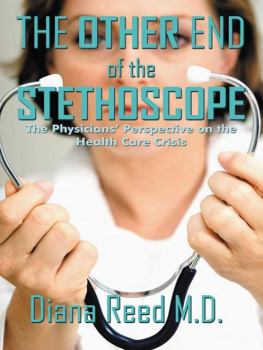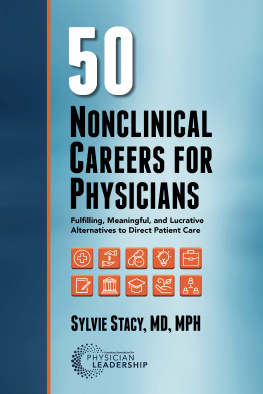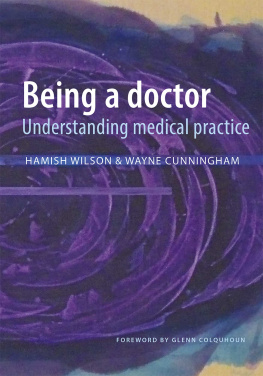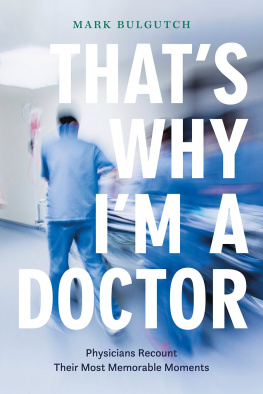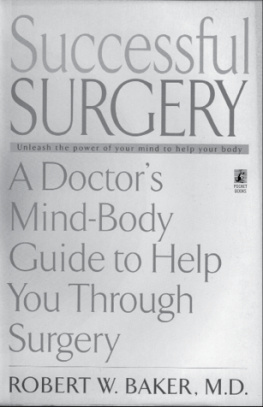THE OTHER END
OF THE STETHOSCOPE
THE PHYSICIANS PERSPECTIVE ON THE HEALTH CARE CRISIS
Diana Reed, M.D.

AuthorHouse
1663 Liberty Drive
Bloomington, IN 47403
www.authorhouse.com
Phone: 1-800-839-8640
2012 Diana Reed. All rights reserved.
No part of this book may be reproduced, stored in a retrieval system, or transmitted by any means without the written permission of the author.
Published by AuthorHouse 2/28/2012
ISBN: 978-1-4685-4412-1 (sc)
ISBN: 978-1-4685-4411-4 (hc)
ISBN: 978-1-4685-4410-7 (e)
Library of Congress Control Number: 2012900909
Any people depicted in stock imagery provided by Thinkstock are models, and such images are being used for illustrative purposes only.
Certain stock imagery Thinkstock.
This book is printed on acid-free paper.
Because of the dynamic nature of the Internet, any web addresses or links contained in this book may have changed since publication and may no longer be valid. The views expressed in this work are solely those of the author and do not necessarily reflect the views of the publisher, and the publisher hereby disclaims any responsibility for them.
CONTENTS
CHAPTER 1:
A CAREER IN MEDICINE
CHAPTER 2:
THE PRACTICE OF MEDICINE
CHAPTER 3:
THE BUSINESS OF MEDICINE
CHAPTER 4:
LIABILITY IN MEDICINE
CHAPTER 5:
THE DOCTOR AS PATIENT
CHAPTER 6:
THE FUTURE OF MEDICINE
A PHYSICIANS PERSPECTIVE
This book is dedicated to my husband Allen and to my best friend, Leslie Maschino, RN, whose support throughout times of sickness and health was immeasurable. Also a special thanks to my friend Glynis Wallace, DMD, who gave me the final push to complete and publish this work.
Leslie and I were sitting around her table when I said half-jokingly, I should write a book about what its really like to be a doctor in this day and age. Most people dont seem to have any idea how tough things have gotten. The glorified lives of doctors on TV are far from real life. Maybe people would understand then how difficult it is for physicians to practice, and appreciate their doctors more. Instead of laughing or belittling the idea, she encouraged me to go for it, and so this book became an eight-year-long projecta labor of love.
My purpose in writing this book was to inform and educate people about the life of a doctor, the rigorous training involved, the daily routine of medical practice, and the difficulties of reconciling the business of medicine with our ultimate goal of healing. My emphasis is on how the health-care and malpractice crises affect physicians, and on how the doctor-patient relationship has suffered. I explain how physicians cope with illness as patients. I report initial responses of physicians to the passage of the new health-care plan. And I present suggestions for solutions to the continuing problems facing doctors in this country.
I was trained in California, attending UCIrvine for medical school and UCSan Diego for a neurology residency. I have worked in five different states, in solo private practice, small groups, large multispecialty groups, locum tenens, academic university practice, and I have been employed in radiology managed care. I had two children during medical school, and at the peak of my clinical career I became disabled. With a wide range of experience in medicine and in lifes challenges, I felt that I had something to contribute to the health-care literature, especially in light of the changes coming as a result of the Patient Protection and Affordable Care Act of 2010. While there is promise of improving access to health care for patients, the burdens placed on physicians and their attitudes toward this legislation need to be discussed. We need to understand the issues from the physicians perspectivefrom the other end of the stethoscope.
The contents of this book reflect my opinions and experiences, except where supported by surveys of physicians, statistics or specific references.
My mission is to convey the importance for all people to pay attention to the medical profession, to understand their physicians struggles and rewards, and to assist in salvaging the relationship between doctor and patient, which is suffering. I hope this book helps to promote better communication and transparency in the medical field. My advice to those of you considering a career in medicine or surgery is to go into it with open eyes and an open heart. For the rest of youhumanityplease remember that physicians too are only human.
My healing hands
Are tied
By loopholes,
Knotted by lawyers,
Bound by insurance or
Lack thereof.
Would that I could
Give it all up, but
This calling is strong.
I was created
To serve.
Every day
I rise above
The frustration.
To experience
The joy of healing
Is my lifes purpose.
Do you think doctors have it made? When you get sick and need a doctor in the middle of the night, do you take for granted that doctors will always be available to care for you? Would you want to be a doctor in this day and age? Why are we losing good doctors to early retirement and other careers?
Most people are aware that there is a health-care crisis in America. However, few have examined the crisis from a physicians point of view. The general public, the government, and insurance companies are mainly concerned with the cost and availability of medical care. How these issues are affecting Americas doctors is a mystery to most people. Few people have insight into the daily struggles that physicians face in the twenty-first century while trying to provide excellent care to their patients. People seem to have forgotten that physicians are the foundation of health care, and without them there would be no one to administer treatment, perform surgery, or interpret results for disease or trauma.
A huge number of physicians in private practice have dropped out, many seeking alternative careers because of rising job dissatisfaction. In this book, I hope to enlighten readers about the physicians life and how the current medical climate has affected everything we do, every decision we make, and our career satisfaction. The long and rigorous training involved in becoming a physician changes us in ways we never dreamed possible. The interactions with patients that make up our days can be difficult and rewarding, as well as intense and stressful. The doctor-patient relationship has deteriorated and is fraught with mistrust from both ends of the stethoscope. If we are to turn the current situation around, we must understand the issues.
In this book, I will discuss the difficulties involved in the business of medicine and the gradual loss of the private-practice model as huge conglomerate health-care corporations take over this countrys delivery of medical care. Finally, I will provide a perspective on the future of physicians and medical care in America. I will make some suggestions on how patients and physicians can work together to reverse some of the trends that are hurting health care in America.
Every living person should have concerns about health care. If you sit in a public place and listen to the conversations of people around you, the subject eventually turns to health problems that they or someone they know are having. People used to complain that their doctors acted as if they thought they were God. Nowadays, people seem to expect their doctors to be godsperfect in their diagnosis and treatments and able to predict the future. When the physician fails to live up to those expectations, as they inevitably do, since they are human, patients often see this as a reason to sue. Many people use an illness with a poor outcome as a chance to win millions of dollars in awards from jackpot juries in the litigation lottery. The people on these juries often feel sorry for the injured parties, but this doesnt mean there is always negligence on the part of the physicians. Lawyers also try to increase their odds of winning a verdict by suing everyone involved in the patients care. If successful, the lawyers get to keep an average of one third of the award for themselves. Its no wonder the number of malpractice claims and insurance ratesare increasing dramatically every year.
Next page
